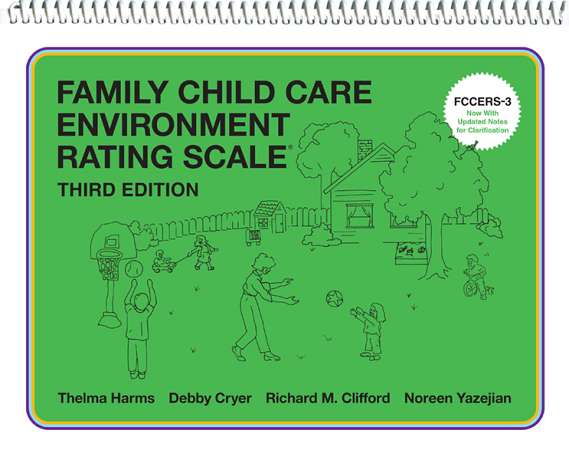Professors: Request an Exam Copy
Print copies available for US orders only. For orders outside the US, see our international distributors.
Third Edition
Thelma Harms, Debby Cryer, Richard M. Clifford, Noreen Yazejian
Publication Date: June 28, 2019
Pages: 104

This title is in the Environment Rating Scale® Family of Products—the leading research-based tools to optimize the quality of children’s early learning.
Building on feedback from the field, as well as current research on supporting young children’s development and learning, the authors have revised and updated the widely used Family Child Care Environment Rating Scale®. FCCERS-3 is the next-generation assessment tool for use in home-based child care programs for children from infancy through school age (birth through age 12).
FCCERS-3 focuses on the full range of needs of the wide age-range of children often found in family child care programs. Further, the scale assesses both environmental provisions and provider–child interactions that contribute to children’s learning and development, including language, cognitive, social-emotional, and physical development, as well as concerns for health and safety.
FCCERS-3 is appropriate for state- and district-wide QRIS and continuous quality improvement, for provider self-assessment, and as a learning or monitoring tool within networks of family providers. The established reliability and validity of the scale make it particularly useful for research and program evaluation with family child care programs.
While the approach to assessing quality and the scoring process remain the same, users of FCCERS-3 will find the following improvements informed by extensive use in the field and by the most recent research:
Suitable for use in inclusive and culturally diverse programs, FCCERS-3 subscales evaluate:
Thelma Harms, Director of Curriculum Development Emerita, Frank Porter Graham Child Development Institute, University of North Carolina at Chapel Hill and Director, Environment Rating Scales, Inc.
Dr. Harms is recognized internationally for her work on assessing care and educational programs for children and as lead co-author of the four Environment Rating Scales (ECERS, ITERS, FCCERS, and SACERS). Much of her consultation through the Environment Rating Scales Institute (ERSI) has focused on preparing professionals in the use of the scales for research, technical assistance, training, and program assessment in Quality Rating and Improvement Systems (QRIS) and similar quality enhancement projects in the United States and abroad.
Debby Cryer, Scientist Emerita, Frank Porter Graham Child Development Institute, University of North Carolina at Chapel Hill and Director, Environment Rating Scales, Inc.
Dr. Cryer was a principal investigator for the national study on Cost, Quality and Child Outcomes in Child Care Centers, continued those interests in the European Child Care and Education Study, and is the lead co-author of a curriculum called “All About Preschoolers.” She regularly provides consultation on establishing quality rating and improvement systems and provides training on the scales internationally. She is lead author on All About ECERS-R and All About ITERS-R.
Richard M. Clifford, Senior Scientist Emeritus, Frank Porter Graham Child Development Institute, University of North Carolina at Chapel Hill
Dr. Clifford was a principal investigator on the National Center for Early Development and Learning study of state-funded pre-kindergarten programs and Co-Director of the companion SWEEP study, served as Director of the NC Division of Child Development, and was one of the principal investigators on the Cost, Quality and Child Outcomes in Child Care Centers study. Dr. Clifford is a past president of NAEYC.
Noreen Yazejian, Senior Research Scientist and Lead, Research and Evaluation Division, Frank Porter Graham Child Development Institute, University of North Carolina at Chapel Hill
Dr. Yazejian’s early childhood research and program evaluation studies have focused on professional development, models of programming birth to 5, home visiting, quality rating and improvement systems, early childhood language and literacy, and the use of data for continuous quality improvement. Her research has been published in Child Development, Early Childhood Research Quarterly, Early Education and Development, Social Policy Report, and NHSA Dialog.
“The FCCERS-3 is a well-designed assessment of the overall quality of FCCHs. Observer reliability for the measure has been demonstrated. The Environment Rating Scales instruments have been shown to provide scores that are considered valid, and subsequent research investigating validity issues is planned for this specific measure. The instrument is administratively flexible, and scoring/interpretation are straightforward. This instrument appears to be a high-quality measure of the quality of FCCHs.”
—The twenty-first mental measurements yearbook, the Buros Center for Testing
“The Environment Rating Scales have proven to be an invaluable resource for assessing the quality of child care classrooms. These comprehensive tools truly allow providers to see classrooms through the eyes of the children they care for and the results obtained offer clear feedback that helps teachers improve and grow.”
—Angela Keyes, assistant professor of psychiatry, Tulane University Director, Quality Start Assessment Team of Louisiana
Contents
About the Authors iv
Acknowledgments 1
Introduction to the FCCERS-3 2
What Is Substantially Different in the FCCERS-3 from the FCCERS-R? 3
Reliability and Validity of the FCCERS-3 3
References 6
Administration of the Scale 9
Scoring System 11
Use of the Scoresheet and the Profile 11
Explanation of Terms Used Throughout the Scale 12
Overview of the Subscales and the Items of the FCCERS-3 15
Rating Scale Items and Notes for Clarification 17
Space and Furnishings 17
Personal Care Routines 25
Language and Books 33
Activities 45
Interaction 65
Program Structure 77
Scoresheet follows page 81
FCCERS-3 Profile
Professors: Request an Exam Copy
Print copies available for US orders only. For orders outside the US, see our international distributors.